So many questions around probiotics for children and what exactly are the best probiotics for children?
It’s a very common question series I get…
Should I give my child a probiotic? If, so, which one? And how do you give it to your children?
The truth?
You must work with your child’s pediatrician on it for best results.
I’m not a doctor or a nutritionist; I don’t play one here.
But I will gladly share with you what I do because I believe most people can apply it for their own children.
Let’s cut right to the chase. Here is how I answer those questions above for my own children:
Yes my children get a probiotic. They use the same one I do – the Just Thrive Health probiotic. The difference is how much they get at any given setting and how its consumed.
Now, there is so much more to it than just that simple answer, but the good news is that I’m breaking probiotics, their health benefits, and probiotics as they relate to children in this article.
What are Probiotics?
Probiotics are active cultures of bacteria that can colonize in your gut.
This helps to reestablish healthy levels of bacteria within your small intestine and large intestine, which can be a game-changer for your overall health.
A healthy gut microbiome (the collection of bacteria, yeasts, and other microbes) help not only to digest food, but also to manufacture vitamins, prevent harmful pathogens, regulate immune health and connect to mood.
The integrity of your gut plays a key role in ensuring the rest of your body is functioning at its optimal position.
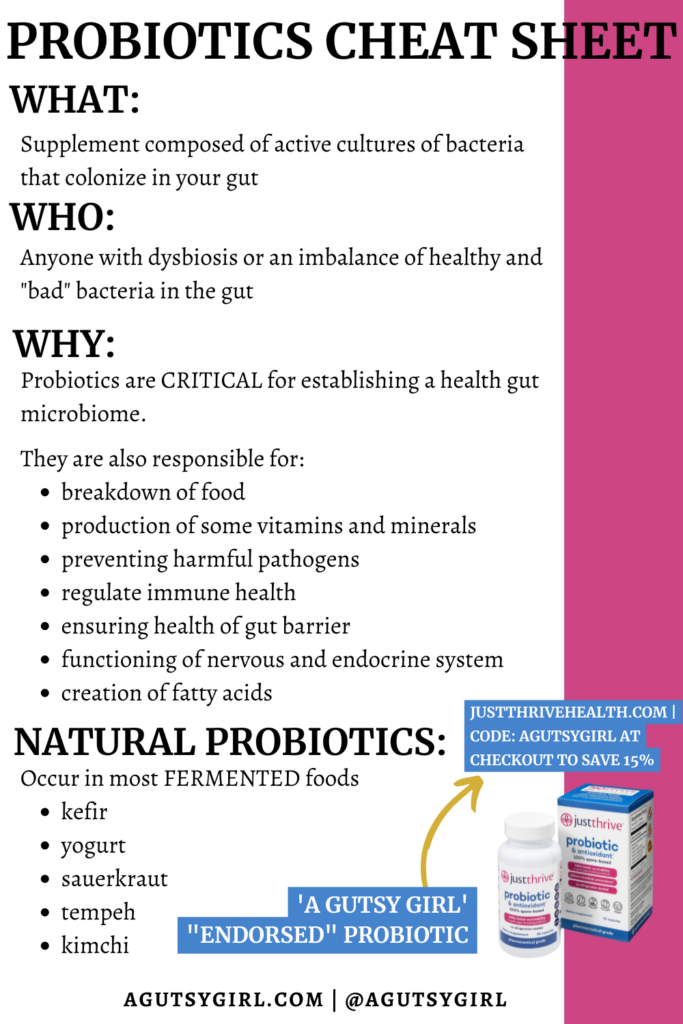
Some other functions of healthy bacteria in the gut include:
- ensuring health of gut barrier
- regulating enzyme action
- creation of cytokines (key player in immune system)
- functioning of nervous and endocrine systems
- creation of fatty acids
Most probiotics contain different levels of Lactobacillus, Bifidobacterium, Saccharomyces, Streptococcus, Enterococcus, Escherichia, and Bacillus.
These can be extremely helpful in individuals with irritable bowel syndrome who suffer from bacterial dysbiosis.
This means that the “bad” bacteria have overrun the “good” bacteria and the gut is no longer in its optimal state.
Probiotics can help to regrow friendly bacteria colonies that push out the bad bacteria.
Source: HERE
The Importance of Good Gut Health for Children
In his book, Healthy Gut, Healthy You, Dr. Michael Ruscio states,
This is because the world of bacteria that will be with you the rest of your life (your gut microbiota) develops to a large extent by the second to third year of life.
Some interesting points he makes in Chapter 5 of the book include:
Note: Chapter 5: How Early Life and Environment Impact Your Gut and Immune System
- He has a box of some common autoimmune diseases and their targets. For example: inflammatory bowel disease – intestinal tissue, depression – brain tissue, MS – nervous system cells.
- “Antibiotics should be used on babies and young children only when absolutely necessary.”
- “Some researchers now think that the stress of labor causes temporary leaky gut in the mother, which then allows the mom’s gut bacteria to colonize the child.”
- “If you can hand wash your dishes, buy from a farm or maybe a farmers’ market, and serve fermented foods, you may feed your microbiota and see some nice immune system benefits.”
- “As a quick refresher, probiotics are healthy bacteria an prebiotics are foods that feed these bacteria.” (Learn more: Prebiotics vs. Probiotics.)
- “This study found that a mixture of traditional lactobacillus- and bifidobacterium-type probiotics reduced the incidence of eczema when given to children under two.”
- “Intestinal inflammation at two months of age predicted skin allergy and asthma at six years of age.”
Besides that, and in general, here are some important reasons why good gut health is vital for children:
- Nutrient Absorption: The gut is responsible for absorbing nutrients from a child’s diet. A healthy gut ensures proper absorption of essential vitamins, minerals, and other nutrients necessary for growth and development. It helps support their immune system, maintain healthy bones, and foster brain development.
- Digestive Function: A well-functioning gut promotes proper digestion, ensuring that food is broken down and absorbed efficiently. It helps prevent digestive issues such as constipation, diarrhea, and bloating, which can be uncomfortable for children.
- Strong Immune System: The gut plays a significant role in the immune system, as a significant portion of the immune cells reside in the gut. A healthy gut microbiome (the collection of microorganisms in the gut) helps modulate the immune response, making children less susceptible to infections, allergies, and autoimmune conditions. Did you know? 70-90% of the immune system lies in our gut?!
- Mental Health: Emerging research suggests a strong connection between gut health and mental health. The gut is often referred to as the “second brain” due to the gut-brain axis, a bidirectional communication system between the gut and the brain. A healthy gut microbiome is associated with improved mood, cognitive function, and reduced risk of mental health disorders such as anxiety and depression.
- Allergies and Asthma: A balanced gut microbiome may help reduce the risk of developing food allergies and asthma in children. It influences the immune response to allergens and helps regulate the body’s inflammatory processes.
- Weight Regulation: Maintaining a healthy gut microbiome may contribute to weight regulation and prevent childhood obesity. Certain gut bacteria have been associated with metabolic health, while an imbalance in gut flora could potentially lead to weight gain and related health issues.
So let’s dive back into the conversation around the benefits of probiotics for children.
Are Probiotics in Supplement Form Safe for Children?
It’s generally accepted that probiotics are not only safe for children, but can also be truly beneficial. As with adults, probiotics can regulate the digestive system and help boost the immune system.
For children, probiotics can also reduce respiratory tract infections, diarrhea, colic, and even tooth decay. Some research also suggests that probiotics help kids avoid conditions like autoimmune diseases, allergies and asthma, but more research is needed.
Dr. Samonte cautions, though, “probiotics are safe for kids, unless your child has a compromised immune system, cancer or is a premature infant.”
I was not giving Samarah probiotics freely as a preemie (she was born at 26 weeks; 2.4 pounds).
Best Probiotics for Children
Click HERE to save this article on the best probiotics for children for later.

As I already mentioned, my children take the same one I already know, love, and trust – Just Thrive Health.
Trust me, it’s not just me loving on them. Huge names in the industry stand behind the product, too.
And that’s largely due to the fact that Kiran Krishnan is part of the equation. He is highly intelligent and fascinating.
Kiran, who has worked with these strains for years, had his new born daughter taking the powder a few years ago- he would sprinkle a bit of the powder from our capsules on his wife’s nipple while the baby was nursing so that his daughter could get some of the strains.
In fact, you can hear him speak on probiotics via Episode 9 of the A Gutsy Girl podcast show.
According to the Just Thrive Health website, Just Thrive® can be mixed in different foods to be given to children over the age of 3.
Some specific reasons I love the Just Thrive probiotic include:
- It contains a patented strain called Bacillus Indicus HU36®, which produces antioxidants in the digestive system – where they can be best absorbed by your body.
- Bacillus coagulans (found in the Just Thrive Probiotic) is a probiotic bacterium that produces spores. Due to its excellent stability, you’ll find it in medicine, food and chemical industry. Recent studies have shown that B. coagulans has therapeutic effects on intestinal diseases, such as acute diarrhoea, irritable bowel syndrome, antibiotic-related diarrhoea, constipation and colitis via modulation of the microbiota composition, host immunity and metabolism. source
- Two isolates of B. subtilis examined here were HU58, a human isolate and PXN21, a strain used in an existing commercial product. Compared to a domesticated laboratory strain of B. subtilis both isolates carried traits that could prove advantageous in the human gastro-intestinal tract. source
- 1000x better survivability vs. yogurt, greek yogurt & leading probiotics
- Supports immune health in the digestive system, where over 70% of it lives
- Powerful digestive support
- Improved flora balance
- Increased digestive nutrient absorption in the intestines
- Powerful antioxidant and carotenoid production at the most bio-available location in your body – your own little nutrient factory!
- Ingredients matter! Their formulations are all-natural, non GMO, and made WITHOUT soy, dairy, sugar, salt, corn, tree nuts or gluten
- Vegan, Paleo and Keto Friendly
- Just Thrive has the ability to produce up to 25 specific antibiotics when they sense pathogenic organisms and also create compounds and nutrients that feed naturally occurring beneficial bacteria.
The Probiotic Now in Gummy Form!
Finally, not only does this probiotic come in a capsule that can be opened up and sprinkled over food as a probiotic powder, but it now also comes in probiotic gummies form, making it very easy for children to consume. The gummy is just a delicious treat and easy way to get probiotics into kids while also containing the same incredible strains as the original probiotic.
Unlike other products, the Just Thrive Health gummies are guaranteed to arrive in your gut 100% alive for maximum effectiveness.
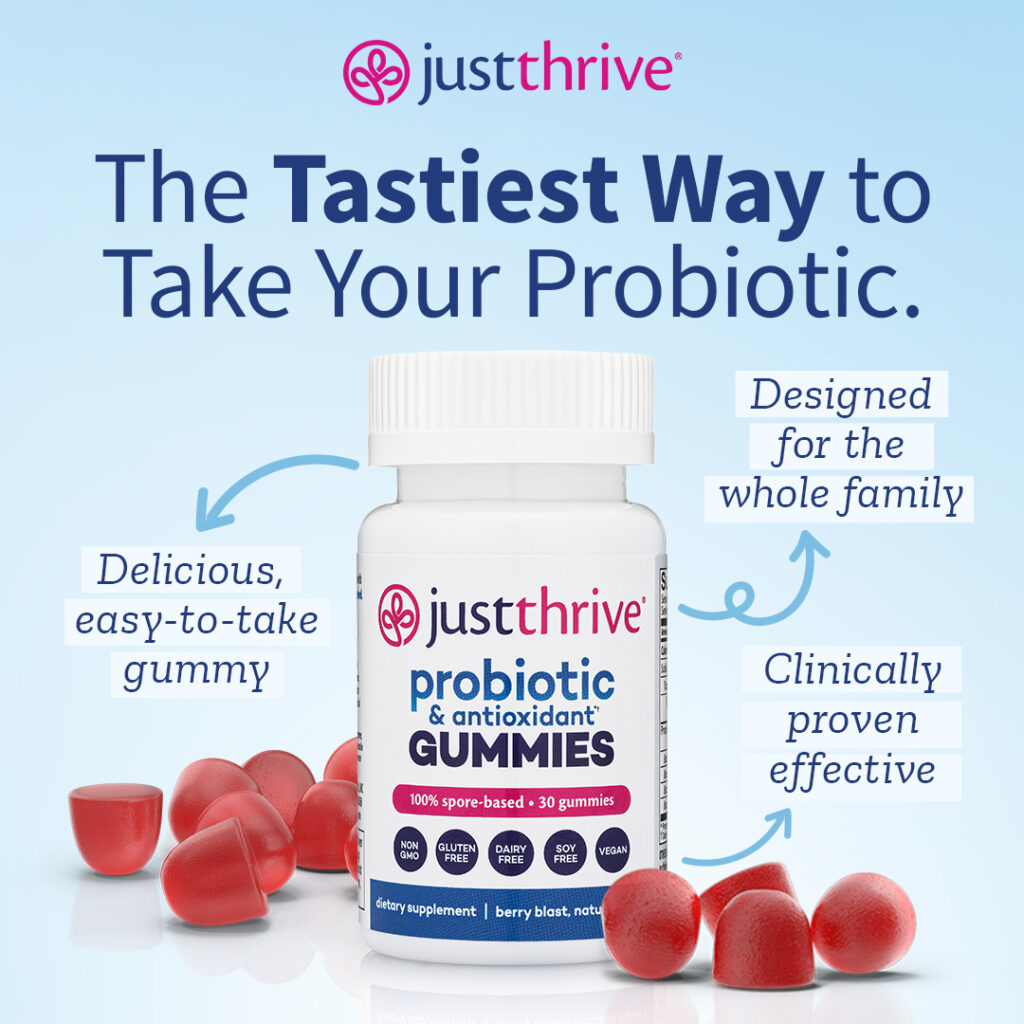
The Just Thrive Health probiotic – NOW as gummies!
Use code AGUTSYGIRL at checkout to save 15% off your order at Just Thrive Health.
Other Probiotic Brands for Children
But let’s just say you don’t want to use the Just Thrive Health probiotic.
The NIH states,
Based on currently available evidence certain probiotic strains (Lactobacillus rhamnosus GG [LGG] and Saccharomyces boulardii) have proven effect in the treatment of acute gastroenteritis and prevention of antibiotic associated diarrhea.
So, here are some other thoughts and options:
- What does your child need? Check out Probiotic Strains vs. Species HERE.
- Have an infant? Check out the Powder L. reuteri supplement HERE.
- Consider the NOW Foods BerryDophilus Kids HERE if you want chewable tablets.
- There is a pure powder to check out from Garden of Life – RAW Probiotics Kids – Acidophilus and Bifidobacteria Organic Probiotic HERE.
- Culturelle Kids Probiotic
Probiotic-Rich Foods
On top of probiotic supplements, some foods naturally contain a high level of good bacteria for their little bodies.
Here are two that my children like, that most children like, and that are easy to incorporate into the diet.
KEFIR
Kefir is a milk product that has been fermented to let certain bacterial colonies further grow. It not only has high levels of bacteria but also has several enzymes such as lactase that help to digest its milk sugars.
It also contains yeast that can help with fungal overgrowth (SIFO).
YOGURT
Yogurt is one of the most popular sources of probiotics in a healthy diet as it can easily be added to most meals.
It is mainly composed of lactic acid and bifidobacteria. Be careful and ensure that your yogurt does contain live cultures, artificial flavors and no added sugar if looking for a probiotic source.
Some brands kill off the bacteria due to high levels of processing.
Some more of the best probiotic foods and probiotic food sources include:
- Miso is fermented soy. It makes an awesome soup.
- Sauerkraut, pickles, and kimchi are fermented vegetables.
- Kombucha is a fermented tea. I would never give my kids an entire bottle of this, but sips here and there because they love “Booch.”
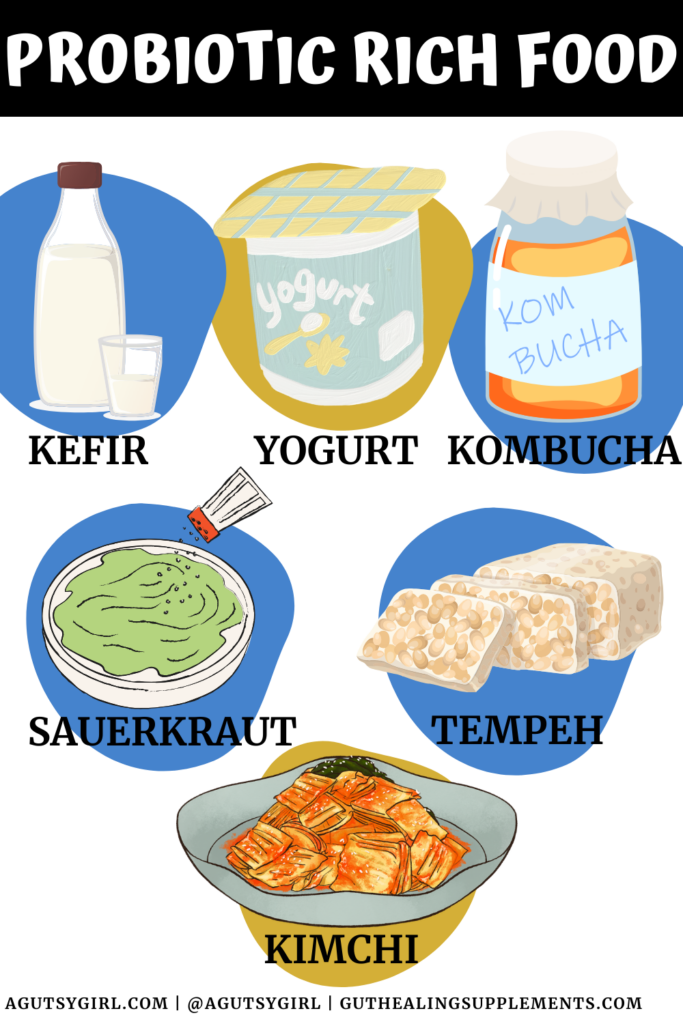
Sneaking Probiotics Into Their Meals
I’ve never been one to sneak a ton of vegetables into my children’s meals.
No, I’d rather them enjoy eating fruits and vegetables for what they are.
They will only be little for awhile; the trickery can’t last.
Once they are a little older, if they don’t know what something is, they definitely won’t like it.
Anyways, I do sneak probiotics into their meals.
The reason? The probiotic is flavorless, so it doesn’t matter. And I want to give them the best probiotic, the one I take, but at 7, 8, and 9-years-old they don’t enjoy swallowing a bunch of whole capsules.
So, if you don’t want to try the gummy probiotics, consider simply opening up the capsule and pour a little bit into their food.
They may or may not know; it doesn’t matter, they can’t see or taste it.
Remember, the reason I can do this is because the Just Thrive Health probiotic can survive low and high heat.
A good probiotic should be able to!
So what types of meals do I add the probiotic to?
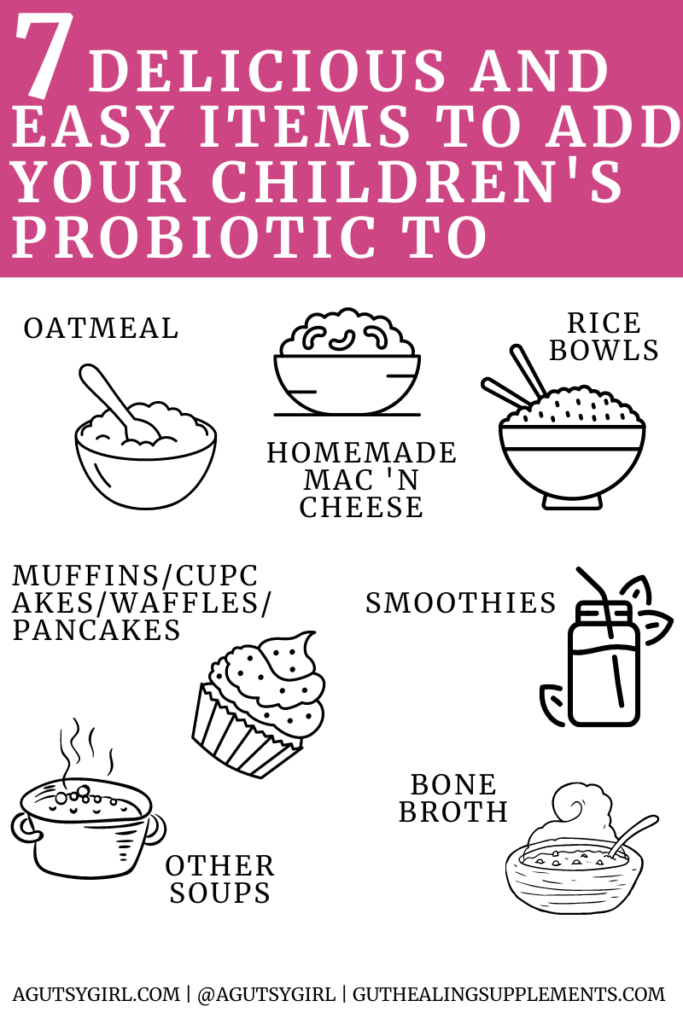
7 Delicious and Easy Items to Add Your Child’s Probiotic To
Click HERE to save these for later.
- Oatmeal. Stir it into hot oatmeal and/or sprinkle over any kind of cold cereal in general. We love Puffins, so this is an easy cereal to add it to.
- Vegan Mac ‘n Cheese. I’ve even showed you how to do it with the recipe HERE. What child doesn’t like Mac ‘n Cheese?!
- Smoothies. This one is super simple. Make your smoothie, add the probiotic. My kids love everything from fruity to choclate-based smoothies. The sky is the limit.
- Soup. Any and all soups.
- Rice bowls. We make a lot of rice bowls, so I’ll usually add the probiotic at the point when I’m stirring the rice and olive/coconut oil together. Blends in perfectly.
- Bonus: bone broth! This is the ultimate because they are getting all the bone broth benefits with the probiotic boost. p.s. HERE is how to get your baby to drink bone broth.
- Muffins/cupcakes/waffles/pancakes. Literally, you can add the probiotic to the batter, cook/bake, and then serve.
By the way, a lot of times I even get my kids involved with this. I let them open up the capsule and sprinkle just a little bit over their food. They think it’s fun 🙂
Children and Probiotics
Okay, I hope that has shed some good light on probiotics for children. I’m never saying, “This is what you must do in order to receive beneficial effects for your your child’s digestive health.”
I am simply always saying, “Here is an option. This is what I do and why I feel like the use of probiotics is beneficial. Work with your doctor and/or nutritionist.” Got it?!
Remember, if you choose to purchase anything from Just Thrive Health HERE, you’ll save 15% off your entire order.
But also, I do make a small amount from each order. This does not get me rich, but it does allow me to keep producing the information on this website to you – for FREE. And I’m always grateful for your support.
My full disclosure can be found HERE.
If you liked this post on the best probiotics for children, you might also enjoy:
Xox,
SKH
🤰 bloating be gone! weight loss through optimal gut health for women
💃ʜᴇᴀʟ ʏᴏᴜʀ ɢᴜᴛ. ʜᴇᴀʟ ʏᴏᴜʀ ʟɪfe.
🫶🏻 founder gutbyome.com


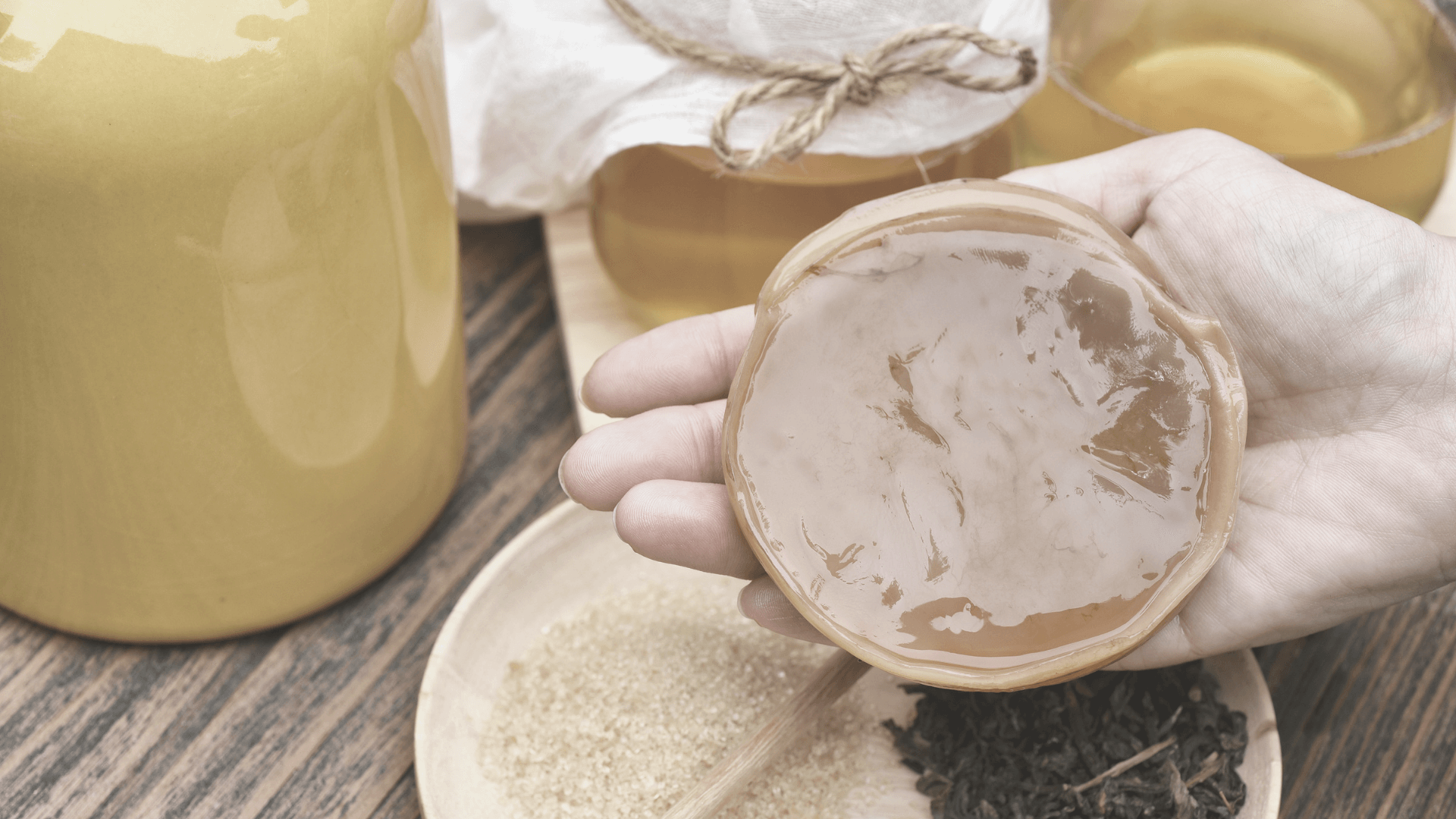
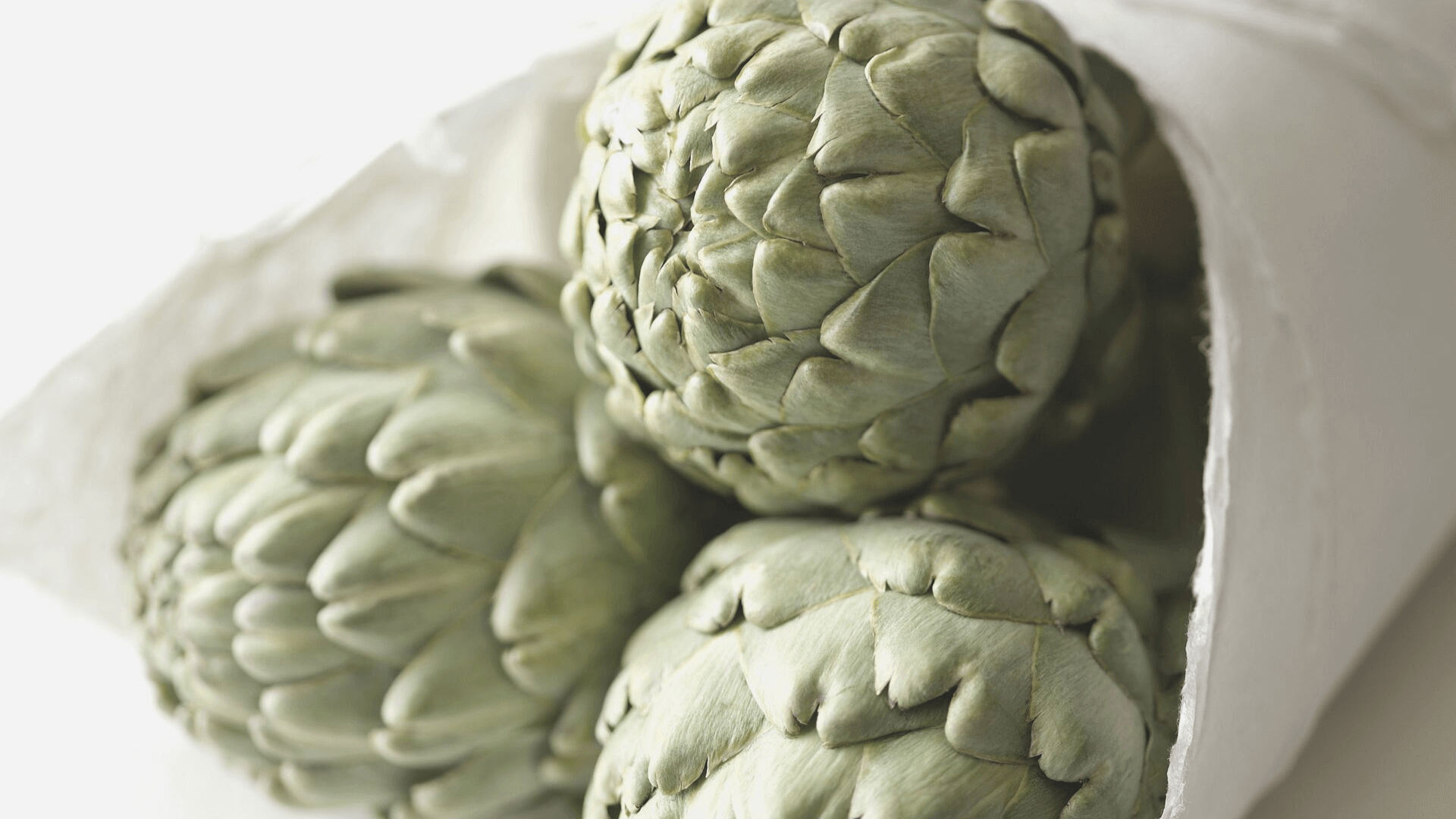


![Low FODMAP Recipes [Create Your Own Buddha Bowl]](https://agutsygirl.com/wp-content/uploads/2020/10/recipes-featured-agutsygirl.com_.png)